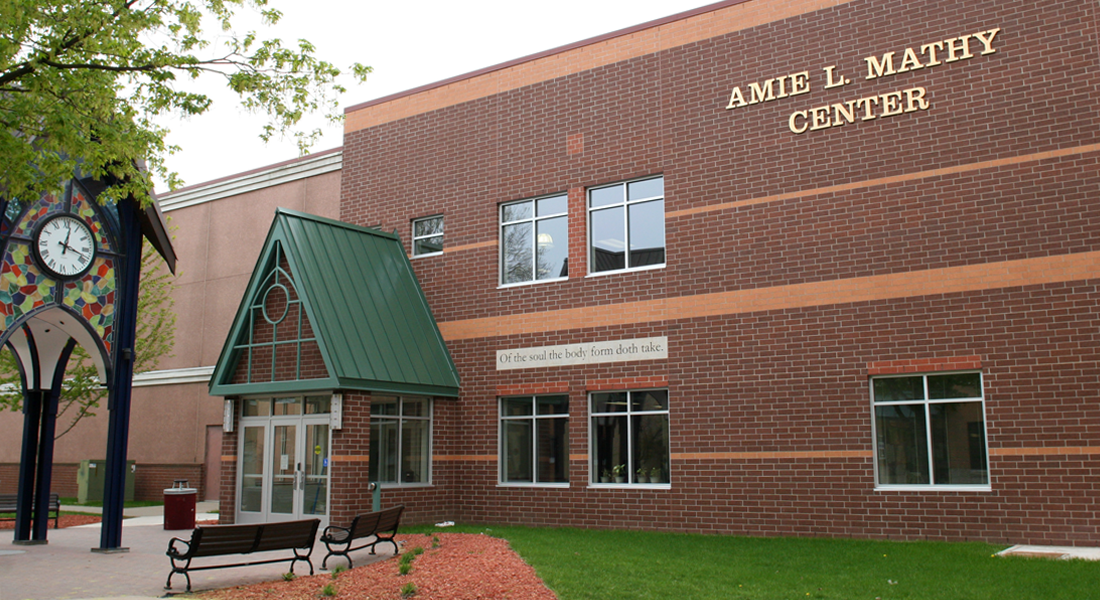
Viterbo University has joined forces with many community partners over the years. The partnership with the Boys & Girls Clubs of Greater La Crosse has paid especially good dividends, with new joint ventures holding promise for great return on investment for the university, the club, and the community.
The roots of Viterbo’s partnership with the Boys & Girls Clubs go back to the late 1990s. That’s when Viterbo’s decision to build a campus recreational center for students coincided with the club’s plans to create a new facility to serve youth on the South Side of La Crosse.
This June will mark the 20th anniversary of the first meeting of Viterbo and club representatives to seriously explore the prospect of a joint recreation center. Two years later, a campaign to raise $7.5 million to construct the center was launched, led by co-chairs John Desmond and Scott Mathy.
The campaign was a success, and last September marked 15 years since opening day for the Amie L. Mathy Center for Recreation and Education, the first joint venture of its kind in the country.
The partnership has deepened over the years, with university students getting the chance to work at the club and learn from that work. Club members, meanwhile, learn and grow from the time spent with Viterbo students.
Pathway to a Bachelor’s Degree
In fall 2019, Viterbo launched a new initiative to open educational doors for BGC members, both at Mathy Center and the club’s other branches in the region. The new program, dubbed Pathway to a Bachelor’s Degree, consists of three parts: Viterbo University scholarships, a college mentorship initiative to support scholarship recipients on their educational journey, and two free Viterbo for-credit college preparatory classes offered every summer at the Mathy Center.
The first recipient of a four-year, full-tuition Pathway scholarship, Danessa Brocks, just completed year one at Viterbo. In the fall, Brocks will be joined by at least two additional scholarship recipients: Rebecca Strittmater, who aims to become an occupational therapist, and Nathaniel Powell, who plans to study business and compete as a member of Viterbo’s track and field team.
The Pathway program has grown since the first year, offering three scholarships per year, one for the winner of the BGC Youth of the Year Award, and two just for members at the Mathy Center club. A third 2021 scholarship winner is expected to be named.
The Pathway program is an investment in the community aimed at opening a route to a college education that might not seem possible to many BGC members. That investment to fund Pathways comes from Viterbo and its generous benefactors and partners.
The program recently got a $100,000 gift from the Franciscan Sisters of Perpetual Adoration, who founded and grew Viterbo into the institution it is today. “Our foundresses understood the power education has to change lives, and we continue to minister both inside and outside traditional classrooms,” FSPA President Sr. Eileen McKenzie said in announcing the gift this spring. “The possibilities of this program are endless.”
It’s generous support that makes the Pathway program possible, said Jim Salmo, Viterbo’s vice president for institutional advancement. “We are incredibly grateful to the FSPA and to everyone who supports this important program,” Salmo said. “We know it will make a tremendous difference in the lives of our local future leaders.”
Mental Health Collaboration
The BGC and Viterbo also have joined forces with the La Crosse Area Family YMCA to work on an effort to offer mental health programming and resources at the Y and the BGC’s Erickson club.
The collaboration grew out of the Y’s Dinner Table Resilience program, which included skill sheets and a series of brief videos. This spring, counselors-in-training began developing materials adapted from the program under the supervision of Viterbo doctoral student Tara Allert and Sarah Johnson, the Y’s mental health director.
“As the partnership with the Y evolved, we were also lucky enough to extend this collaboration to the Erickson Boys & Girls Club,” Allert said. “These agencies and key staff supports have shown a willingness to jump into innovative work, which is facilitating community resilience and a shared dialogue about mental health.”
